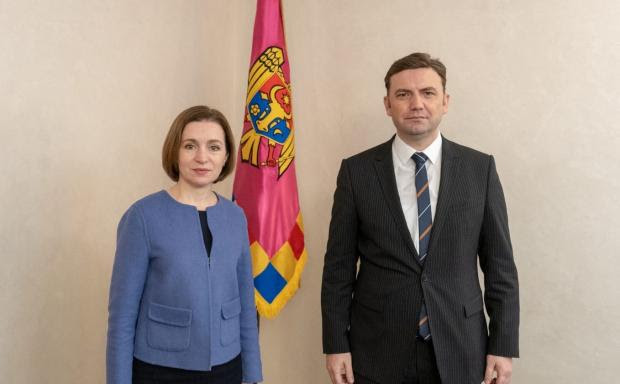The OSCE Chairman-in-Office, Minister of Foreign Affairs of North Macedonia Bujar Osmani, concluded his visit to Moldova.
In Chisinau, Minister Osmani met with President Maia Sandu, Deputy Prime Minister, Minister of Foreign Affairs and European Integration of the Republic of Moldova, Nicolae Popescu, and Deputy Prime Minister for Reintegration Oleg Serebrian. He also met with the President of the Parliament of Moldova, Igor Grosu. The discussions focused on the OSCE’s efforts in Moldova, the current state of affairs in the Transdniestrian Settlement Process and the Organization’s support in overcoming challenges created by Russia’s war against Ukraine.
“The OSCE is fully aware of the ongoing challenges you face. Being here today is a clear signal of our Chairpersonship’s support to Moldova in addressing these challenges. The aggression against Ukraine has created specific challenges for the Transdniestrian Settlement Process. This vital process is a clear priority for our Chairpersonship,” said Osmani.
The visit aimed at supporting a comprehensive and lasting political settlement of the Transdniestrian conflict in all its aspects, strengthening the independence, sovereignty and territorial integrity of the Republic of Moldova within its internationally recognized borders with a special status for Transdniestria.
Chairman Osmani also met with Transdniestrian leader Vadim Krasnoselsky and the Transdniestrian Chief Negotiator Vitaly Ignatiev in Bender.
On both banks of the Dniester/Nistru River, Osmani reiterated the importance of the 5+2 talks and maintaining dialogue. Additionally, OSCE Chairman-in-Office highlighted and welcomed the continuity of the 1+1 format.
“The OSCE will stand behind any effort that provides positive dynamics in support of the full implementation of previously agreed measures and identification of new areas for agreement,” added Osmani.
Chairman Osmani underlined the need to further build trust and constructive dialogue between the Sides for the benefit of the affected population on both banks of the Dniester/Nistru River.
During the course of his visit, Minister Osmani also met with the Special Representative on Gender, Liliana Palihovici, and members of civil society working on human rights, democratization and gender equality.
During his meeting with the staff of the OSCE Mission to Moldova, he expressed his gratitude and further encouragement for their important work. Osmani also visited a volunteer centre for support of the Ukrainian refugees and witnessed first-hand the incredible work of many young people, who are providing essential support to the refugees.

